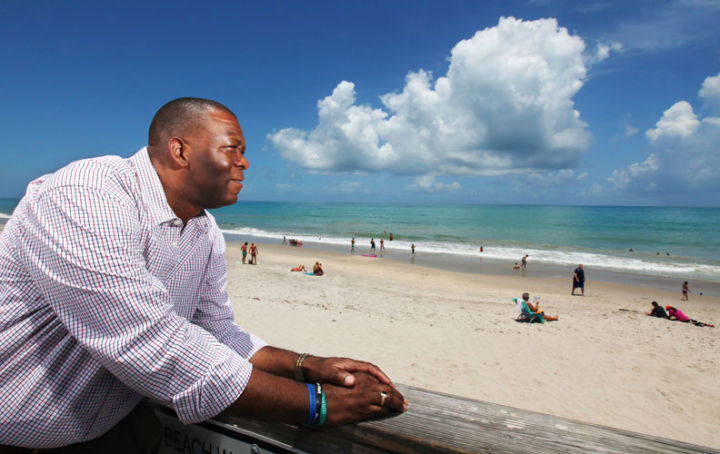
SEBASTIAN — Wesley Campbell sat on the sand at the base of a green-leafy coconut tree and dreamed the dream of Jamaica. Salt air breezes that send worries on their way. No timetable; you get there when you get there.
Today, Campbell’s sandy beach is on Indian River County’s shore, assigned here as luck – or a legal windfall – would have it.
The Sebastian resident and restaurateur took a counterclockwise path to get here, by way of one of the highest paying areas of the culinary industry, Washington, D.C.
Campbell was born in Montego Bay in 1962, the year Jamaica received its independence from Great Britain. The island jewel become the darling of tourists from every culture and land that ever tried to tame the Caribbean marvel.
Tourists rarely see farther than the shoreline, which is made to sparkle with all the coins they bring.
Campbell is from the countryside. There are no buses, so getting to school means a five-mile walk. The only water source is from a single community pipe, and when it is broken, it means a two-mile walk to haul back a day’s supply.
Call it poverty. Campbell calls it paradise.
“You may live poor but you live free. In the country, that’s where you get the ‘No problem, mon’ culture.
“You don’t go hungry because there are so many fruits and vegetables growing all around.”
The city was a different story.
“City life it is harder to get food because you don’t have the trees for food,” he said.
His country life was better-fed still because his family owned a restaurant.
In Jamaica that might mean a mom-and-pop establishment, literally.
Campbell tried his hand at various dishes, urged on by his teachers who would come for a meal.
Like so many people in countries rural or urban, life’s accomplishments often are traced back to the inspiration of a teacher.
“They told me I could do it, so I said, OK, I guess I can then. So I will,” Campbell said.
At age 14, he entered a cooking contest and astonished judges with a sophisticated dish of his own creation. From then, his life and career evolved into a modern day culinary reality show, racking up award after award.
He got a job as a prep cook for the five-star Half Moon Resort in Jamaica, quickly moving up the totem pole of cooking tasks. The resort sent him to Austria for further training.
One day, a friend left to open a restaurant in Washington, D.C. The friend would need expertise not easily found domestically in order to become economically viable, and that is the green light for a green card into the United States.
Now on this side of the Gulf Stream, Campbell discovered the meaning of American freedom.
He was “free” to work as many hours as he wanted in order to attain more material success.
Also a culture shock, Campbell discovered racism for the first time in his life.
“So many times in my first year I put my head in my hands and said, ‘My Lord, why did I leave my beautiful island to come here? Jamaica is a melting pot, Germans, Italians, Indians, Chinese, Japanese. There, they all saw the value in me because it is Jama-aa- aica, man. Charming, you know. Not here.”
Campbell helped his friend launch Montego Bay Café and moved on to greater heights at upscale restaurants, eventually becoming a corporate chef over numerous stores.
A self-described workaholic, he did not even have time to date. Instead, he asked a friend to find him a good woman.
The friend brought him Loreen, a fellow Jamaican ex-pat, whom he married four months later in what could be described as a working marriage.
Eventually, Campbell discovered one thing that moved faster than he did up the corporate ladder: the growth of his children before his eyes, and he was missing it.
This is when fate dealt him the Sebastian hand.
Success can come with the traveling companions worry, doubt, fear – and legal troubles.
A lawsuit settlement came in the form of a vacant piece of land way south of his D.C. digs. He decided to pay his dirt a visit.
A trip to the Sebastian area is not complete without a visit to the shore, and there is when Campbell found what he was missing.
“In Maryland, you are on the water, but it is black and gray. When I came here and I saw blue water I said ‘wow!’ this is where I want to be.”
While having his home built in 2005, he was recruited by townspeople who felt he should fill the local void for good Caribbean food. This led him to the 13421 U.S. 1 spot where he placed Mo-Bay Grill.
While he gladly downsized his life to spend more time with his family, the money part continues to be a struggle.
The restaurant is well loved by its fans, but, again, Campbell finds a culture shock.
Mostly, he said, it is that people associate Jamaican food with hot jerk spice emblazoned with hot pepper, rather than its rainbow of spices that contain only flavor, no heat.
His menu is as much a melting pot as is true Jamaica, a collection of his favorite dishes from choice cultures.
“We are educating the culinary palate,” said Campbell, who works the back of the house – the kitchen – while Loreen works the front of the house. “We are a fine dining establishment where you can hear nice music, have glass of wine or Red Stripe beer, and feel laid back. No worries. No problems.”



